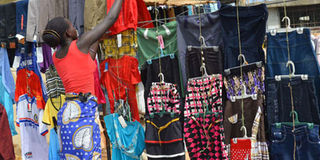If you miss them, then you’re missing out

A mitumba trader markets her merchandise in Kakamega Town on July 27, 2015. Unfortunately, women are chronically underserved by financial service providers. PHOTO | NATION MEDIA GROUP
What you need to know:
- Data on registered firms shows that women hold ownership roles in 48 per cent of Kenyan SMEs.
- WWB is working with KCB to identify opportunities to better meet the needs of women-led SMEs.
The International Finance Corporation says that 65 per cent of women-led small and medium-sized enterprises (SMEs) in the developing economies are either unserved or underserved financially.
For a woman entrepreneur in Kenya and across Africa, the odds are already stacked against the growth potential of her business.
SMEs provide 80 per cent of Kenya’s employment and contribute 20 per cent of our GDP, according to latest reports from African Economic Outlook.
BANKING
Data on registered firms shows that women hold ownership roles in 48 per cent of Kenyan SMEs.
This does not account for businesses in the informal sector, which employs 12 million Kenyans, a large portion of whom are women.
Unfortunately, women are chronically underserved by financial service providers.
The World Bank says that only 51 per cent of Kenyan women have access to a simple bank account, much less a business loan or insurance to protect them financially.
LOANS
According to a recent analysis by Women’s World Banking (WWB), a global non-profit of which I am a founding member, nine banks comprise a 65 per cent share of the market in Kenya.
However, few have a targeted approach to serving SMEs, much less women-led SMEs, specifically.
This is unacceptable as women entrepreneurs not only require, but will also thrive with a full set of diverse financial products.
The WWB study also uncovered significant barriers for women accessing loans, including high turnaround time for banks.
TRANSPARENCY
This is prohibitive for women who risk losing business opportunities while waiting for loans.
Women also have mistrust around transparency and cost of loans due to the influence of many bad lenders, as well as a lack of trusting relationships with the banks, lack of collateral, and the perception that interest rates will be high for low-income clients.
Thankfully, Kenyan institutions are starting to address these barriers.
Kenya Women Microfinance Bank (KWFT) offers a loan designed specifically for women-led SMEs that need access to working capital to expand their businesses.
CHALLENGES
These loans have flexible monthly repayment amounts, security and collateral requirements, and longer repayment periods.
WWB is also working with KCB to identify opportunities to better meet the needs of women-led SMEs.
The study with KCB included an assessment based on interviews with bank personnel, a branch visit and customer interviews; industry research, including interviews with key stakeholders and competitor institutions; and customer research involving focus groups with both women and men who operate SMEs in Nairobi, customers and non-customers.
The WWB study found that banks serving the SMEs face many constraints.
CENTRAL BANK
Obstacles such as collateral law, capital requirements, and loan classification regulations, are particularly challenging for women entrepreneurs.
We are seeing many areas of progress, including the Central Bank of Kenya’s Kenya Bank Reference Rate, established in 2014, a benchmark for pricing all variable rate loans or credit to increase transparency.
It also established the Credit Reference Bureau, which permits commercial and microfinance banks to share credit information.
I challenge all financial service providers and regulators to build on this momentum and follow the steps of KWFT, WWB and KCB in Kenya and across Africa to serve women entrepreneurs.
They are a profitable, sustainable customer base poised to help our communities and the economy to thrive. If you miss them, then you are missing out.
Dr Riria is the group CEO of Kenya Women Holding and honorary co-chair of the Women’s World Banking Africa Advisory [email protected]




